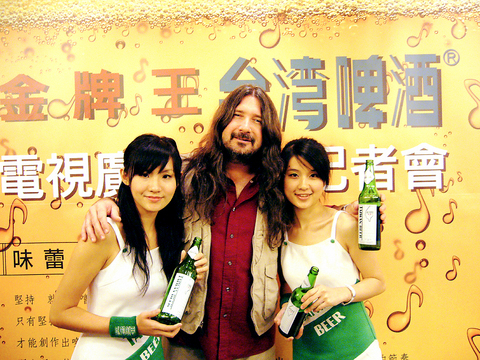Taiwan Beer got a new look earlier this week, when popular environmentalist and musician Matthew Lien stepped up to become the official advertising face for Taiwan Tobacco & Liquor Corp's (TTL,
While endorsing beer is a new direction for the eco-musician who is better known for his sanctioning of, and support for, cultural events and environmental awareness programs for children, it isn't the first time he's been used by a local company to advertise its products.
Five years ago Lien's environmentally friendly image was used to advertise a brand of canned coffee. The coffee advertising campaign might have proven mildly successful, but Lien never envisioned that one day he'd be the poster boy for Taiwan Beer.

PHOTO: GAVIN PHIPPS, TAIPEI TIMES
"I was pleasantly surprised and had no idea that I was on [TTL's] radar. It certainly suits me, though. I mean, I've drunk so much Taiwan Beer over the years that I probably should be a shareholder and I have no problem in endorsing the product as it's a [good] product," Lien said.
"In the long run I think it will lighten the public perception of me which is one of contemplation and of being quite serious."
While it is the first time the company has used a foreign face to advertise and endorse its products, Lien is the second musician to have been enlisted in order to popularize a brand of beer.
Earlier this year the TTL enlisted the help of Taiwan's best-known rock and roller, Wu Bai (
Following the success of the Gold Medal brand, TTL decided to introduce more brands in order to fend off some stiff competition from its closest rival Heineken, which is the second best selling beer in Taiwan and accounts for 8 percent of the market.
The new TV commercial, which is set to begin airing later next month, is radically different from Wu Bai's noisy rock and roll beer image. The 30 second advertisement features Lien as he peacefully records the sounds of nature. While recording he befriends a group of river tracers and after jumping from the top of the waterfall and enjoying a brisk swim Lien and his new friends enjoy a glass of Superbrew Taiwan Beer together.
TTL will have to wait and see how the image of a foreigner seen drinking and endorsing Taiwan Beer on national TV will sit with the masses more accustomed to the loud Wu Bai commercial, but the company feels it has made the right choice.
"It's a new brand and we wanted to take a different approach. We wanted to show how fresh the beer is and how natural the ingredients are," said TTL Chairman Ray Dawn (
According to figures made available from TTL, on average 475 million liters of beer are consumed in Taiwan every year, which when you work it out on an individual level equates to roughly 21l for each of the nation's 23 million inhabitants.
Whether Lien's face will increase these percentages isn't yet known, but regardless of the eventual outcome the eco-musician has a few choice words of wisdom for drinkers of "other" brands who might be contemplating switching to Superbrew.
"If everyone does their patriotic duty and adheres to the product then you never know," quipped Lien. "[We] could drink [our] way to independence."

Towering high above Taiwan’s capital city at 508 meters, Taipei 101 dominates the skyline. The earthquake-proof skyscraper of steel and glass has captured the imagination of professional rock climber Alex Honnold for more than a decade. Tomorrow morning, he will climb it in his signature free solo style — without ropes or protective equipment. And Netflix will broadcast it — live. The event’s announcement has drawn both excitement and trepidation, as well as some concerns over the ethical implications of attempting such a high-risk endeavor on live broadcast. Many have questioned Honnold’s desire to continues his free-solo climbs now that he’s a

As Taiwan’s second most populous city, Taichung looms large in the electoral map. Taiwanese political commentators describe it — along with neighboring Changhua County — as Taiwan’s “swing states” (搖擺州), which is a curious direct borrowing from American election terminology. In the early post-Martial Law era, Taichung was referred to as a “desert of democracy” because while the Democratic Progressive Party (DPP) was winning elections in the north and south, Taichung remained staunchly loyal to the Chinese Nationalist Party (KMT). That changed over time, but in both Changhua and Taichung, the DPP still suffers from a “one-term curse,” with the

Jan. 26 to Feb. 1 Nearly 90 years after it was last recorded, the Basay language was taught in a classroom for the first time in September last year. Over the following three months, students learned its sounds along with the customs and folktales of the Ketagalan people, who once spoke it across northern Taiwan. Although each Ketagalan settlement had its own language, Basay functioned as a common trade language. By the late 19th century, it had largely fallen out of daily use as speakers shifted to Hoklo (commonly known as Taiwanese), surviving only in fragments remembered by the elderly. In

Lines between cop and criminal get murky in Joe Carnahan’s The Rip, a crime thriller set across one foggy Miami night, starring Matt Damon and Ben Affleck. Damon and Affleck, of course, are so closely associated with Boston — most recently they produced the 2024 heist movie The Instigators there — that a detour to South Florida puts them, a little awkwardly, in an entirely different movie landscape. This is Miami Vice territory or Elmore Leonard Land, not Southie or The Town. In The Rip, they play Miami narcotics officers who come upon a cartel stash house that Lt. Dane Dumars (Damon)